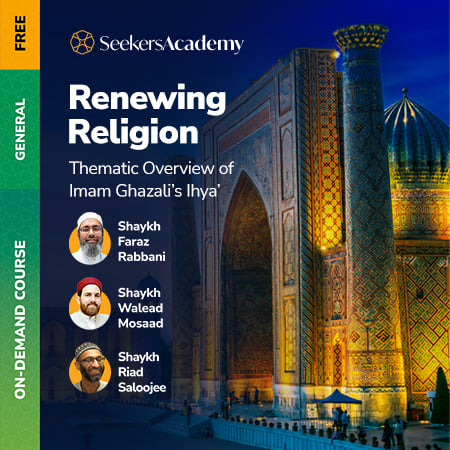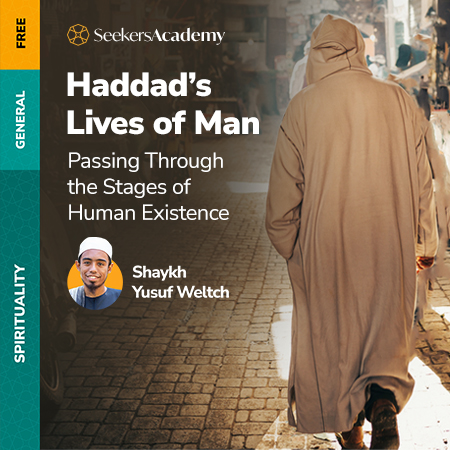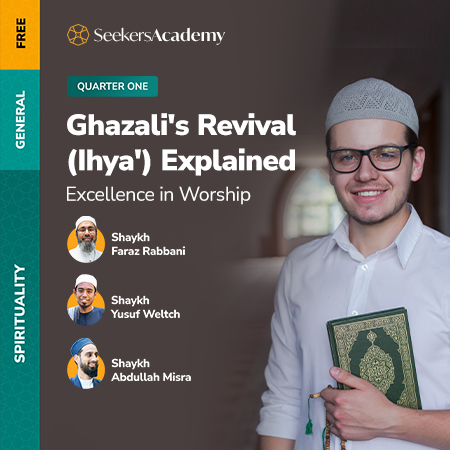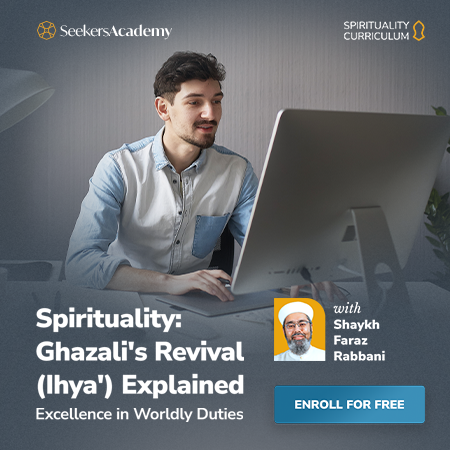
This overview of Imam Ghazali’s great work, Ihya Ulum al-Din (Renewing the Religious Sciences) will serve as a blueprint for how the believer can bring their religion to life. It will aim to help the believer to not just practice the outer form of the religion properly, but to also to bring its spirit to life and practice it with excellence.
- Teacher: Ustadh Tabraze Azam
- Teacher: Shaykh Walead Mosaad
- Teacher: Imam Yama Niazi
- Teacher: Shaykh Faraz Rabbani
At the end of this course, students will be able to:
- Understand the structure of Imam Ghazali's Ihya Ulum al-Din (Renewing the Religious Sciences).
- Explain the sins of the limbs and ways to avoid them.
- Practice the outward and inward aspects of religion with excellence.
- Gain clarity on how to attain higher spiritual states.
- Discuss the actions that lead to salvation.

This is a Level One course based on the amazing work of Imam ‘Abdullah bin ‘Alawi al-Haddad titled Lives of Man. Imam Haddad was a late 17th, early 18th-century scholar and sage from the city of Tarim, in the Hadramawt valley of South Yemen. The text answers two existential and essential questions that every Human asks themselves at some point in their life, ‘Where did I come from?’ and ‘Where am I going?’
Every Muslim, young or old, should take this course for without answers to these fundamental questions to life, one will be hindered in the pursuit and attainment of life’s purpose. Knowing the ‘Why’ makes accomplishing the ‘What’ easier and more worthwhile. All this in hopes to achieve the ultimate success of Allah’s sweet eternal contentment and nearness.
This class touches on and clarifies important issues relating to the Muslim’s beliefs. Furthermore, it contains great knowledge pertinent to one’s spiritual journey in seeking nearness to Allah Most High. For this reason, beginning students, alongside intermediate and advanced students should have a study of this amazing work. That said, it fits nicely in the learning objectives of each level of study.
We hope to accomplish a fundamental knowledge of the five stages that humans pass through from the beginning of their existence as souls not yet embodied up till they are situated in one of the two final abodes: Paradise or Hell-Fire. Additionally, we will seek to clarify what the Human must do in order to prepare for death and achieve the greatest success in this world and those to come. And only from Allah is the ultimate success.
- Teacher: Shaykh Yusuf Weltch
Of all of his amazing works, Imam Haddad’s Lives of Man is unique and essential to the core realities of what it means to be Human. The text explains the five lives that each human passes through since the initiation of their existence:
• The Pre-Worldly Life
• The Worldly Life
• The Intermediary Life
• The Life of Judgment Day
• The Life of the Eternal Abode.
Imam Haddad ingeniously explains each life and what the human is to do in order to attain ultimate success in the worldly life and those to come. Lastly, this book adds a beautiful benefit to the already beneficial curriculum.
- This course is for people aged 15 - 80.
- It is particularly beneficial for adults.
- It is a Level One course. There are no prerequisite requirements.
- This course can also be taken by anyone who is interested in knowing more about Islamic beliefs, or spirituality.
- Understand, articulate and apply realities core to their purpose in life.
- Apply these principles in their lives going forward, in their outlook, their goals, and their choices.

How does one revive one’s religion and relationship with Allah? In this critical class, Shaykh Faraz Rabbani, Shaykh Abdullah Misra, and Shaykh Yusuf Weltch summarize the teachings of Imam Ghazali’s masterpiece of Islamic knowledge and spiritual guidance, Revival of the Religious Sciences (Ihya’ ‘Ulum al-Din).
This text is split into four quarters. Quarter One concentrates on knowledge, beliefs, and acts of worship. This quarter aims to take our worship from mere forms to deep acts of devotion–brought to life and revived through sincerity, excellence in following the sunna, and consistent action.
The condition for real worship is belief in our Lord. Belief, in turn, is based on knowledge. Accordingly, Imam Ghazali starts the journey of spirituality with knowledge, then beliefs, and then proceeds to worship.
By applying the lessons learned in this course, students will be able to develop reverence and awe, sincerity and presence of heart in their worship–be it prayer, fasting, zakat, or Hajj.
This class presents the key aspects of Imam Ghazali’s teachings without complicating issues. It allows people of all ages to benefit from a magnificent work of spirituality, and from practical teachings that relate to us in our day-to-day lives.
Essentially, through this course, the student will learn how to bring Prophetic guidance to life, practically and deeply.
- Teacher: Shaykh Abdullah Anik Misra
- Teacher: Shaykh Faraz Rabbani
- Teacher: Shaykh Yusuf Weltch
The masterpiece of Imam Abu Hamid al-Ghazali, Ihya’ ‘Ulum al-Din, consists of forty Books organized into four Quarters. In this course, Quarter One of the Ihya’ on Excellence in Worship (Books 1 - 10), will be covered.
Imam Ghazali’s work is focused on teachings relevant to every stage of our lives. Said to be the greatest scholarly work from the writings of the scholars, the Ihya’ teaches the importance of cultivating spirituality through the Sacred Law - making it the practical tool all believers can benefit from.
The Ihya’ is about bringing religion into the lives of everyone who studies it. Religion is guidance, and guidance is beneficial knowledge. Imam Ghazali introduces all key concepts that are important to our live and afterlife–those things that have to be cultivated,rooted out of our hearts, and upheld at all times. This is why Imam Ghazali’s method of spirituality is often referred to as “practical spirituality.”
- This course is for adults, and for youth seeking to deepen their understanding of Islam.
- It is particularly beneficial for anyone seeking to connect Islamic knowledge to beneficial action, rectifying one’s relationship with Allah, and acquiring sincerity and presence with Allah.
- It is a general enrichment course that anyone can benefit from.
- Distinguish between praiseworthy and blameworthy types of knowledge.
- Learn the etiquettes of seeking knowledge.
- Understand what we believe about Allah Most High.
- Learn how to cultivate God-consciousness in our prayer.
- Understand the etiquettes of giving in charity.
- Realize the true reality of fasting.
- Understand how we can take our fasting to the next level.
- Learn the virtues of the Quran.
- Learn the etiquettes of reciting the Quran.
- Learn the merits and etiquettes of supplication (dua).
- Realize the importance of establishing spiritual routines.
- Understand how night worship can be facilitated.

How does one revive one’s religion and relationship with Allah Most High? In this critical class, Shaykh Faraz Rabbani and Shaykh Abdullah Misra summarize the teachings of Imam Ghazali’s masterpiece of Islamic knowledge and spiritual guidance, Revival of the Religious Sciences (Ihya’ ‘Ulum al-Din).
This text is split into four quarters. Quarter Two of the Ihya’ focuses on the worldly and social duties we have, such as the proprieties of eating and drinking, marriage, earning a living, brotherhood and companionship, social relations, proprieties of seclusion - and other responsibilities.
The human is a social animal - not just an animal. This is a responsibility and trust; and an opportunity of seeking Allah Most High in our worldly living and social duties.
How do we develop God-consciousness in these social duties? It is through acting with dignified restraint in our daily lives. If we can have dignified restraint in regards to things around us that may not be impermissible (haram), then it will be easier to have restraint with things that are impermissible.
This is achieved through making our actions, actions that (1) uphold the limits of Allah Most High; with (2) outward excellence through following the sunna of the Prophet (peace be upon him); and with (3) inward excellence through sincerity and presence of heart.
By applying the lessons learned in this course, students will be able to develop restraint and gratitude in their daily activities, such as how they conduct themselves in their marriage or business dealings.
This class presents the key aspects of Imam Ghazali’s teachings with clarity and context. It allows people of all ages to benefit from a magnificent work of spirituality, and from practical teachings that relate to us in our day-to-day lives.
Essentially, through this course, the student will learn how to bring Prophetic guidance to life, practically and deeply.
- Teacher: Shaykh Faraz Rabbani
The masterpiece of Imam Abu Hamid al-Ghazali, Ihya’ ‘Ulum al-Din, consists of forty Books organized into four Quarters. In this course, Quarter Two of the Ihya’ on Excellence in Worldly Duties (Books 11 - 20), will be covered.
Imam Ghazali’s work is focused on teachings relevant to every stage of our lives. Said to be the greatest scholarly work from the writings of the scholars, the Ihya’ teaches the importance of cultivating spirituality through the Sacred Law - making it the practical tool all believers can benefit from.
The Ihya’ is about bringing religion into the lives of everyone who studies it. Religion is guidance, and guidance is beneficial knowledge. Imam Ghazali introduces all key concepts that are important to our lives and the afterlife–those things that have to be cultivated, rooted out of our hearts, and upheld at all times. This is why Imam Ghazali’s method of spirituality is often referred to as “practical spirituality.”
- This course is for adults, and for youth seeking to deepen their understanding of Islam.
- It is particularly beneficial for anyone seeking to connect Islamic knowledge to beneficial action, rectifying one’s relationship with Allah, and acquiring sincerity and presence with Allah.
- It is a general enrichment course that anyone can benefit from.
- This course can also be taken by anyone who is interested in practical spirituality
- Apply the etiquette of eating
- Strive to fulfill forgotten sunnas of eating with others
- Understand how to fulfill excellence in your marriage
- Learn how to conduct yourself in business
- Develop mindfulness of Prophetic etiquette in the presence of your friends and family
- Learn how and when to command the good and forbid the evil